
https://www.youtube.com/watch?v=VKW99YifhHs
Hyperkalemia (High Blood Potassium Levels) – Hyperkalemia Symptoms & Treatment – Dr.Berg
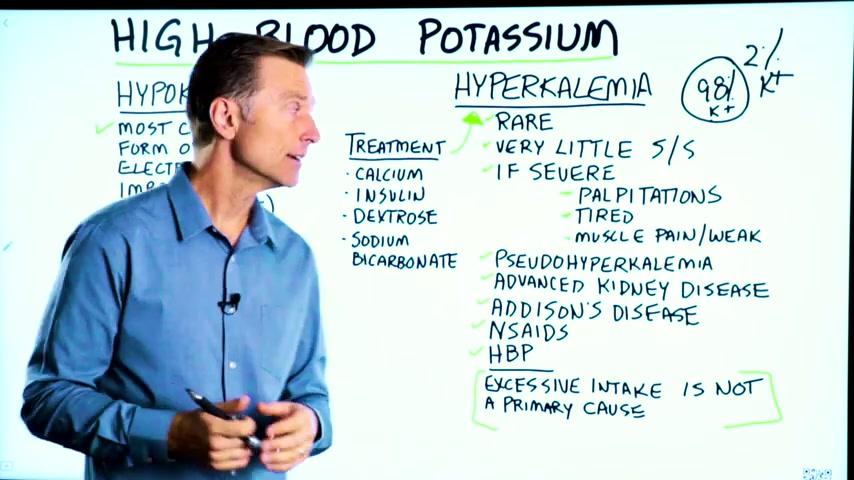
We're gonna talk about high levels of potassium in your blood .
K ?
First thing you need to know is the name of that is hyperkalemia .
When you have a deficiency of potassium in the blood , that's called hypokalemia .
The other thing to know , which is very important , is that 98% of all your potassium in your body is inside your cell , not outside the cell , and not in your blood .
So when we're evaluating hyperkalemia , we're really looking at this 2% .
So we don't really see the whole picture of what's going on .
It's very rare .
There are very little symptoms that are associated with this .
If it's severe , you can get palpitations .
You can be very tired and have muscle pain and weakness .
There's a condition called pseudo hyperkalemia .
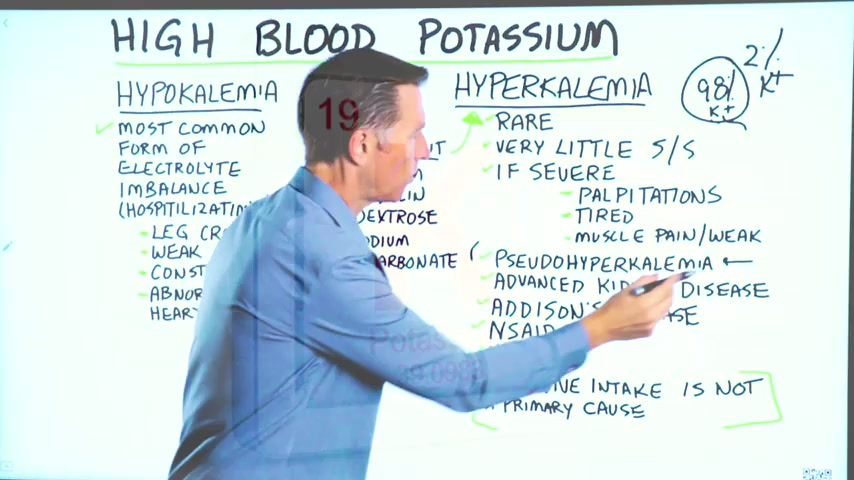
In this situation , when they're drawing your blood to do get the sample to do the testing , If they damage your blood cells as they're drawing it out , there's some type of trauma involved , what happens is it cracks open these cells and leaks out more Potassium giving this pseudo or false impression that you have high levels of Potassium .
So just wanna bring this point up right here .
Now there's a couple reasons why you might have high levels of potassium in the blood .
Advanced kidney disease is probably the number 1 because when the kidney is damaged , you don't release certain minerals , especially potassium .
Addison's disease is another reason .
This is an autoimmune condition of your adrenal glands in which you're losing a ton of sodium .
And when you're losing all the sodium , you're also retaining potassium .
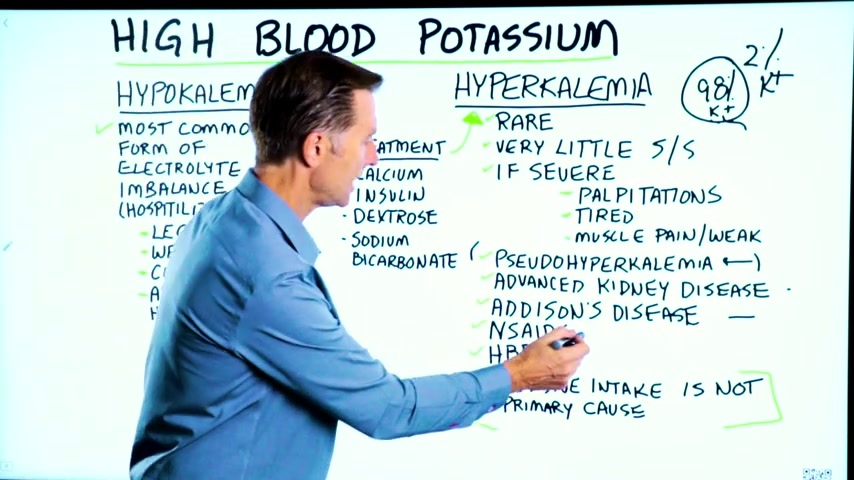
So you would not necessarily ever wanna give someone potassium if they had advanced kidney disease or Addison's disease .
There's a couple medications that can also raise your potassium in the blood .
NSAIDs for pain and certain high blood pressure medications .
Now the other thing to know is excessive intake of potassium is not a primary cause of hyperkalemia .
Why ?
Because your body has certain mechanisms to get rid of excessive potassium .
And this is very different from sodium .
We tend to retain sodium , so if we take too much potassium , our bodies can get rid of it very easily through the urine .

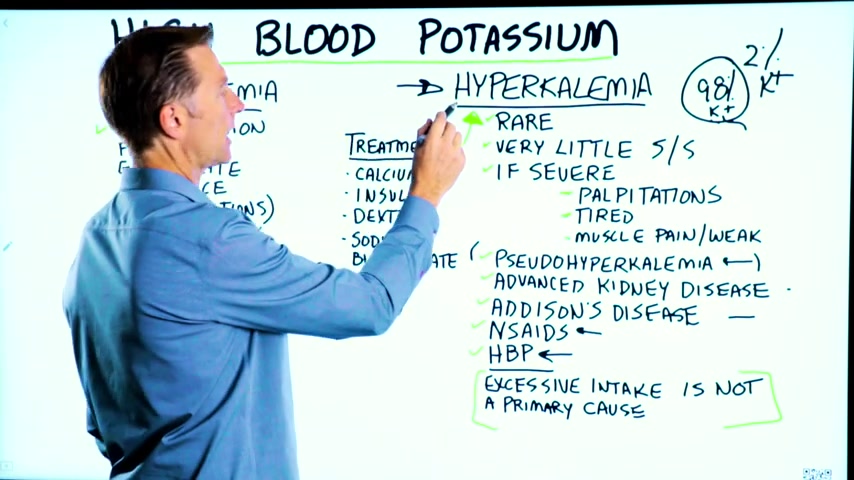
Now what's interesting is the treatment for hyperkalemia is taking certain types of calcium or injecting the person with insulin , and I'm talking medical treatment , or dextrose , which is a sugar , or sodium bicarbonate , which is baking soda .
Now what I find interesting is these 2 things right here , insulin and dextrose .
So if you're in a high carb diet and you're raising insulin or you're gonna elevate sugar , you're gonna create more of a problem with this right here , not this right here .
Now it's also important to talk about the opposite of hyperkalemia , hypokalemia , which is way more common .
It's the most common form of electrolyte imbalance when someone's hospitalized .
And here are a few symptoms , leg cramps , weakness , constipation , abnormal heart rhythm issues , arrhythmias , etcetera .
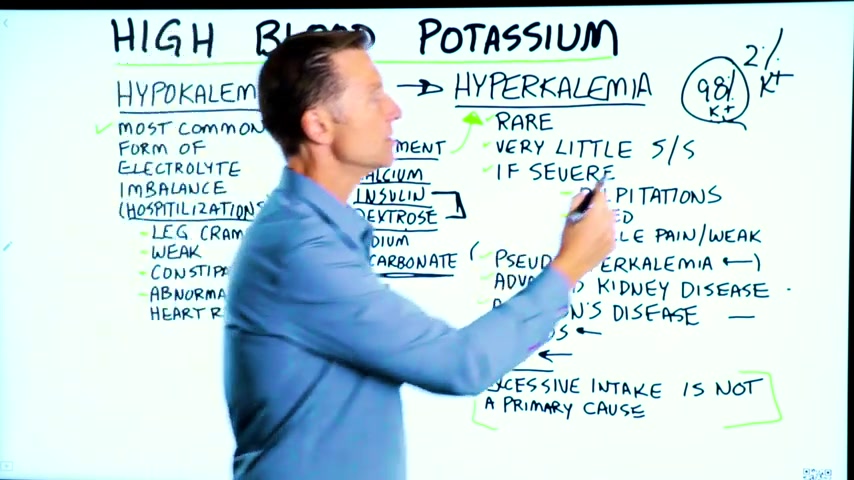
And the main point I wanna bring up , which is the last point , is you have to realize that the majority the vast majority of potassium is inside the cell .
And so measuring it based on the blood is not a good way to determine if you have too much or too little potassium .
There is another test .
It's an intracellular potassium test , which is much more valuable .
And I'm gonna put a link down below if you wanna know more information about that .
I would highly suggest to get this test if you're interested in knowing your intracellular potassium and intracellular magnesium .
It gives you a lot of great data , and it can also tell you if you're at risk for getting arrhythmias because that would be 1 of the big symptoms of that , or even high blood pressure .
Alright .
Thanks for watching , and I'll see you in the next video .

Before you go , if you have a question about a product or you're new to keto and you wanna know how to begin keto , or you're on keto and you need a debug because it's not going smooth , I have a keto consultant standing by to help you .
This is just for the people in the US .
Hopefully , in the future we'll be able to answer everyone's call .
But I put the number down below , so you can call and get some help .

Are you looking for a way to reach a wider audience and get more views on your videos?
Our innovative video to text transcribing service can help you do just that.
We provide accurate transcriptions of your videos along with visual content that will help you attract new viewers and keep them engaged. Plus, our data analytics and ad campaign tools can help you monetize your content and maximize your revenue.
Let's partner up and take your video content to the next level!
Contact us today to learn more.